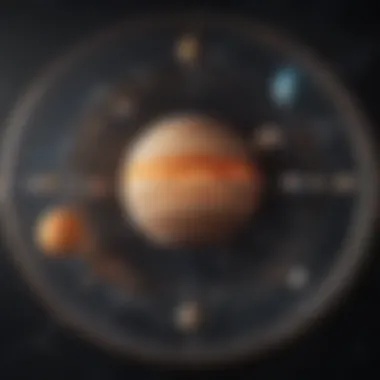Exploring Planetary Signs: Historical and Modern Insights


Intro
The exploration of astronomical signs associated with planets goes beyond mere curiosity for many. Astrological narratives have deep historical roots and continue to play a pivotal role in contemporary society. Understanding these signs offers valuable insight into personality traits, behaviors, and relationships. Each planet embodies distinct energies and influences, contributing to the overall cosmic tapestry that shapes our lives.
This article aims to dissect the intricate relationship between celestial observations and their astrological significance. It will illuminate the ways in which planetary signs guide personal characteristics and interpersonal dynamics, appealing to both scholars and enthusiasts alike.
Prolusion to Astronomical Signs
Understanding astronomical signs is crucial when exploring planets and their astrological implications. These signs provide context to the celestial phenomena that individuals look to for insight into their personalities and experiences. Knowing what these signs mean helps to identify the influence of celestial bodies in our daily lives.
For those engaged in astrology, whether as practitioners or enthusiasts, recognizing the significance of these signs can enhance one’s interpretative skills. It aids astrologers in narrowing down individual traits and offering precise guidance to clients. The application of astronomical signs also influences various aspects of life decisions, relationships, and personal development.
Understanding Astronomical Signs
Astronomical signs serve as markers that delineate the characteristics associated with each planet. These signs are not merely arbitrary; they are foundational elements drawn from extensive historical and scientific observations. Each planet brings its unique energy, which is expressed through these signs. For instance, Mars embodies aggression and ambition, while Venus is related to love and beauty. Understanding these associations allows for a more profound comprehension of astrological insights.
Historical Perspectives
Ancient Civilizations and Their Influence
The influence of ancient civilizations on astronomical signs is undeniable. Civilizations like the Babylonians and Egyptians established early frameworks for interpreting celestial events. They observed the heavens closely and mapped the movements of planets, which allowed them to associate specific traits with celestial bodies. These contributions continue to resonate in modern astrology, where we often refer back to these ancient interpretations.
The unique feature of these early observations is their integration with mythology. Each planet's movements were linked with the deeds of gods and goddesses, giving a narrative quality to their significance. This blend of understanding and mythology has enriched the astrological landscape, making it a popular choice for those seeking to connect personal experiences with universal truths. Nevertheless, these interpretations may seem rigid from a contemporary standpoint, lacking the flexibility modern practitioners often seek.
The Role of Astronomy in Astrology
Astronomy plays a pivotal role in the foundation of astrology. It provides the empirical observations necessary for mapping celestial movements. Without astronomy, astrology would lack its credibility and scientific grounding. This relationship between the two disciplines is symbiotic. While astronomy accurately documents the physical movements of celestial bodies, astrology interprets the implications of those movements on human behavior and experiences.
One significant advantage of this relationship is rooted in its historical continuity. The methods of astronomical observation have evolved, yet the core astrological interpretations remain relevant. This ongoing dialogue between the two fields fosters a deeper understanding of our earthly existence and the cosmic influences at play. However, some skeptics argue that astrology lacks scientific validation, positioning it outside the boundaries of empirical disciplines, which some find limiting.
"Astronomy and astrology, though distinct, share roots that enrich our understanding of the cosmos and ourselves."
Planets in Astrology
The study of planets in astrology provides insights into how celestial bodies influence human personality, behavior, and relationships. Each planet embodies distinct characteristics that resonate with certain traits in individuals. Understanding these planetary influences is valuable for interpreting astrological charts and guiding personal growth.
The Sun and Its Significance


The Sun represents the core identity of an individual. It reflects one's ego, willpower, and fundamental energy. The Sun's position in a natal chart determines one’s basic nature and vital force. It governs creativity and self-expression, highlighting the unique path each person is inclined to follow.
The Moon's Impact
The Moon governs emotions, instincts, and the subconscious. It influences how individuals respond to their feelings and those of others. The Moon's placement affects mood fluctuations and domestic life. It plays a significant role in nurturing and caretaking, impacting relationships and family dynamics.
Mercury: Communication and Intellect
Mercury is the planet of communication, intelligence, and thought processes. It influences how one expresses ideas and gathers information. This planet also governs commerce, travel, and technology. Understanding Mercury's placement is crucial for identifying strengths in communication styles and intellectual pursuits.
Venus: Love and Attraction
Venus embodies love, beauty, and harmony. It influences romantic relationships and personal values. This planet guides what one finds attractive, both in aesthetics and relationships. The placement of Venus can affect partnership dynamics and social interactions, highlighting the importance of love in personal life.
Mars: Drive and Ambition
Mars represents energy, aggression, and ambition. This planet drives action and determination. It influences how individuals pursue goals and handle conflict. The position of Mars in one's chart can reveal insights about assertiveness and competitive behavior, emphasizing personal motivation in various endeavors.
Jupiter: Growth and Expansion
Jupiter is the planet of growth, prosperity, and wisdom. It influences one’s quest for knowledge and experiences. Jupiter’s placement indicates areas of life where one can expect abundance and success. It fosters optimism and a sense of purpose, guiding individuals toward personal development.
Saturn: Discipline and Restraint
Saturn represents structure, discipline, and responsibility. It influences how individuals manage their time and resources. This planet's placement highlights challenges and lessons in life, teaching patience and resilience. Understanding Saturn's role can provide insights into commitments and long-term goals.
Uranus: Innovation and Change
Uranus embodies innovation and unconventional thought. It fosters creativity and rebellion against norms. Its influence encourages individuals to embrace change and seek new experiences. Understanding Uranus can guide one’s interests in social reform and technological advancements.
Neptune: Intuition and Mysticism
Neptune represents intuition, dreams, and spirituality. It influences creativity and idealism. Neptune’s placement in a chart can reveal inclinations toward artistic pursuits and compassion. Understanding the role of Neptune can lead to deeper introspection and exploration of spiritual beliefs.
Pluto: Transformation and Power
Pluto signifies transformation, power dynamics, and rebirth. It governs major life changes and psychological depth. Understanding Pluto's placement can shed light on areas of personal transformation and challenges faced throughout life. It represents the potential for profound change and understanding one’s life path.
In astrology, the influence of each planet is unique and vital for understanding the human experience.


Overall, the planets in astrology serve as intricate guides for interpreting personality and behavior. Each conveys messages regarding growth, challenges, and transformations that shape an individual’s life journey.
Interpreting Planetary Signs
Understanding how to interpret planetary signs is crucial in astrology. This aspect reveals deeper insights into personality traits and behaviors associated with each planet's influence. By analyzing these signs, one can gain a more nuanced understanding of themselves and others. The knowledge of planetary signs can help astrologers provide more accurate interpretations of charts, leading to richer personal insights. Additionally, it plays a significant role in relationship compatibility assessments—analyzing how different signs interact can pave the way for improved understanding and harmony in relationships.
Sign Characteristics and Personality Traits
Each planet correlates with specific characteristics and personality traits. For instance, the Sun signifies core identity and self-expression, while the Moon relates to emotions and intuition. Mercury, on the other hand, governs communication, indicating how individuals express their thoughts. Moreover, the characteristics of planets can vary significantly based on their position within a natal chart. This variability adds layers to the fundamental traits associated with each sign. Understanding these nuances can offer clarity on why a person behaves in certain ways or how they respond in various situations.
"The planets act as mirrors reflecting the myriad complex parts of our personalities, helping us navigate our individual and collective experiences."
It is essential to consider that each sign has strengths and weaknesses. For example, Mars signifies ambition and assertiveness but can also indicate aggression when unbalanced. While interpreting these traits, astrologers often look for patterns. These patterns can reveal how certain qualities are expressed in direct interactions and through life challenges encountered.
Compatibility Among Signs
Compatibility is another vital element when interpreting planetary signs. Each sign interacts uniquely with others, and understanding these relationships can improve personal connections. For instance, fire signs (like Aries, Leo, and Sagittarius) are often seen to complement each other due to shared traits of passion and enthusiasm. Conversely, water signs (such as Cancer, Scorpio, and Pisces) may resonate on emotional levels due to their depth and intuition.
- Complementary relationships often occur between signs that support and enhance each other's traits.
- Challenging relationships might arise between signs that have conflicting characteristics, such as fixed signs like Taurus or Scorpio conflicting with cardinal signs like Aries or Cancer.
In astrological matchmaking, an in-depth analysis yields insights into how two individuals might navigate their shared dynamics. Recognizing patterns in relationship interactions leads to a better understanding of potential challenges and growth opportunities.
Celestial Events and Their Influence
Celestial events have a significant role in astrology. They serve as markers of change and growth in both personal lives and broader societal contexts. Understanding these events helps astrologers give better insights into individual experiences and collective behavior. This section focuses on three essential celestial phenomena: transits, retrogrades, and eclipses, highlighting their impact on our lives and how they integrate into astrological practice.
Transits: Understanding Movement
Transits are the current positions of planets as they move through the sky. Each time a planet moves into a new sign or house, it creates a transit that can influence various aspects of life, depending on the planet's nature and the signs involved. For example, when Jupiter transits through your second house, themes of growth related to finances and personal values may arise. Understanding these shifts can be vital for predicting trends in personal and professional environments.
Key points about transits include:
- The nature of the planet influences the area of life affected.
- Duration of transits varies; slower planets like Saturn may linger, while faster ones like Venus may pass quickly.
- Personal natal chart analysis is essential to interpret the effects accurately.
In practice, monitoring transits allows astrologers to provide timely advice. Recognizing when an individual is likely to experience opportunities for growth or difficulties can be invaluable.
Retrogrades: Impacts on Personal and Collective Experiences
Retrogrades occur when a planet appears to move backward in its orbit. This phenomenon is often associated with confusion, reevaluation, and delays. Mercury retrograde, for instance, is commonly linked to miscommunications and technological issues. However, it can also offer a chance for reflection and reassessment of life paths.


Impacts of retrogrades include:
- A time for deep introspection and setting new resolutions.
- Potential disruptions in communication and travel during Mercury retrograde, which can affect business and personal plans.
- An opportunity to revisit past issues related to the retrograding planet's theme.
Astrologers often advise clients to avoid making significant decisions during retrograde periods unless necessary. This cautious approach can minimize regrettable outcomes.
"Retrograde periods, though often viewed negatively, can serve as a fertile ground for personal growth and enhancement, providing insights that are usually overlooked during direct motion."
Eclipses: Cosmic Shifts in Energy
Eclipses bring profound changes and shifts in energy, making them crucial events in astrology. A solar eclipse often signifies new beginnings, while a lunar eclipse may indicate endings or culminations. Each eclipse can last from six months to a year and often brings themes directly related to the areas of life the eclipses touch.
Important aspects of eclipses involve:
- Timing: Eclipses come in pairs, with one solar and one lunar, and can affect the same area of life for multiple years.
- Emotional significance: Lunar eclipses particularly can stir deep emotions, revealing truths that might have remained hidden.
- Collective trends: Eclipses often point to large-scale societal changes that reflect global currents.
Understanding the energies of eclipses can empower individuals to harness these periods for substantive change. Astrologers analyze natal charts to determine how these celestial events affect personal trajectories.
Ultimately, celestial events remind us of the ever-changing dynamics present in our lives. Recognizing these patterns enriches our overall understanding of astrology, making connections between celestial movements and earthly experiences.
Ending: Bridging the Celestial with the Personal
The conclusion of this narrative on astronomical signs is essential for understanding the intricate connection between celestial movements and individual experiences. It solidifies how planetary influences shape personal identities and relationships. This section summarizes key insights while shedding light on their implications in daily life. Recognizing the interplay between cosmological events and personal traits encourages a more profound comprehension of astrology's role in self-discovery and growth.
Astrology offers a unique lens through which to perceive life's complexities. Through the lens of planetary signs, individuals can foster greater self-awareness. Each celestial body is imbued with distinct characteristics that resonate with personal traits. Understanding these can enhance decision-making and relationship dynamics. The knowledge gained here provides tools for navigating life's challenges, as every transit and aspect unfolds in individual contexts.
In evaluating the cosmic influences, it becomes clear that astrology does not operate in isolation. Instead, it integrates a broader understanding of how the universe impacts life on a fundamental level. Adopting this perspective can lead to a more holistic approach to personal development and relationships.
"Astrology invites individuals to explore their connections with the universe, encouraging a reflective journey toward understanding self and others."
Reflections on Cosmic Influence
The reflections on cosmic influence delve deeper into how astronomical signs and celestial events affect human behavior and experiences. Each planet's movement imparts energies that can profoundly shape personalities and events. By analyzing these cosmic influences, astrologers can better understand individuals as well as societal trends.
For instance, observing the cycles of Venus can provide insights into one’s relations and values, while Jupiter’s cycles can indicate phases of growth and opportunity. Evaluating such planetary movements enables a more nuanced grasp of one’s life path. Many find that engaging with these reflections leads to serendipitous revelations of understanding their lives' rhythms.
Moreover, the collective impact of celestial influences on society cannot be understated. Major astronomical events often coincide with historical shifts, marking important milestones in culture, politics, and social dynamics. This highlights the importance of remaining aware of these movements as they may herald significant trends or changes in global consciousness.
Future Directions in Astrological Study
The field of astrology is continuously evolving. Future directions in astrological study seem promising, with an increased openness to integrating technology and new methodologies. The advent of data analytics, for instance, could allow for more refined interpretations of celestial movements.
Another intriguing avenue for exploration is the integration of modern psychological theories with traditional astrological practices. This could enhance understanding of how subconscious motivations are influenced by the planetary alignments and how they manifest in behaviors.
Furthermore, the increasing interest in astrology among younger generations opens the door for interdisciplinary collaboration, combining insights from fields such as psychology, sociology, and even quantum physics.







